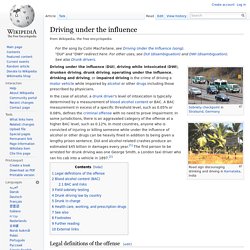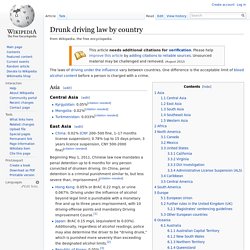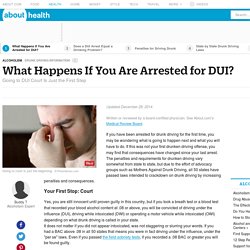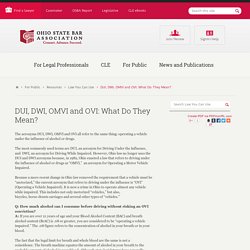

Drink Driving Lawyers, DUI Lawyers - Sydney, Liverpool & Parramatta. Driving under the influence. Road sign discouraging drinking and driving in Karnataka, India Driving under the influence (DUI), driving while intoxicated (DWI), drunken driving, drunk driving, operating under the influence, drinking and driving, or impaired driving is the crime of driving a motor vehicle while impaired by alcohol or other drugs including those prescribed by physicians.

In the case of alcohol, a drunk driver's level of intoxication is typically determined by a measurement of blood alcohol content or BAC. How DUI Works. Driving Under the Influence (DUI) is one of the biggest dangers facing motorists today.

In 2003, 1.4 million Americans were arrested for DUI, and alcohol-related crashes produce an estimated $45 billion in damages every year. On average, a person is injured in an alcohol-related car accident every 30 seconds [ref]. From 2000 through 2005, 103,213 people were killed in alcohol-related car accidents in the U.S., according to Mothers Against Drunk Driving (MADD), a prominent anti-drunk driving advocacy group. Some of these statistics may be slightly misleading. MADD classifies any accident in which a driver had consumed alcohol as “alcohol-related” -- even if that driver is not deemed responsible for the accident. Drunk driving law by country.
The laws of driving under the influence vary between countries.

One difference is the acceptable limit of blood alcohol content before a person is charged with a crime. Asia[edit] What Happens If You Are Arrested for DUI? Updated December 29, 2014.

Written or reviewed by a board-certified physician. See About.com's Medical Review Board. DUI, DWI, OMVI and OVI: What Do They Mean? The acronyms DUI, DWI, OMVI and OVI all refer to the same thing: operating a vehicle under the influence of alcohol or drugs.The most commonly used terms are DUI, an acronym for Driving Under the Influence, and DWI, an acronym for Driving While Impaired.

However, Ohio law no longer uses the DUI and DWI acronyms because, in 1982, Ohio enacted a law that refers to driving under the influence of alcohol or drugs as “OMVI,” an acronym for Operating a Motor Vehicle Impaired. Because a more recent change in Ohio law removed the requirement that a vehicle must be “motorized,” the current acronym that refers to driving under the influence is “OVI” (Operating a Vehicle Impaired). It is now a crime in Ohio to operate almost any vehicle while impaired. This includes not only motorized “vehicles,” but also, bicycles, horse-drawn carriages and several other types of “vehicles.” DUI Lawyer: Do I Really Need a DUI Attorney? Do you need a lawyer to represent you in a DUI case?

Hiring an experienced DUI attorney always has its benefits -- familiarity with the court system, knowledge of plea bargain details, and the ability to navigate complex administration procedures. It's especially important if you are a repeat offender. However, if this is your first DUI and there were no additional or aggravating circumstances such as reckless driving, DUI with a minor in the vehicle, or a high blood alcohol content (a BAC over .12) you may choose to proceed without a DUI attorney. Three Tips In Hiring A DUI Lawyer.